The bentonite market is anticipated to grow from USD 1.6 billion in 2025 to USD 2.9 billion by 2035, representing a steady CAGR of 6.2%. Demonstrating the accelerating adoption of high-swelling bentonite formulations and advanced processing technology across oil and gas drilling, construction waterproofing, environmental sealing, and foundry molding sectors.
The first half of the decade (2025-2030) will witness the market climbing from USD 1.6 billion to approximately USD 2.1 billion, adding USD 500 million in value, which constitutes 42% of the total forecast growth period. This phase will be characterized by the steady adoption of sodium bentonite systems, driven by increasing drilling activity volumes and the growing need for construction waterproofing and environmental sealing materials worldwide. Advanced mineral processing capabilities and automated beneficiation systems will become standard expectations rather than premium options.
The latter half (2030-2035) will witness accelerated growth from USD 2.1 billion to USD 2.9 billion, representing an addition of USD 700 million or 58% of the decade's expansion. This period will be defined by mass market penetration of specialized bentonite grades, integration with comprehensive drilling and construction platforms, and seamless compatibility with existing infrastructure development projects. The market trajectory signals fundamental shifts in how oil and gas operators and construction firms approach drilling fluid optimization and waterproofing quality management, with participants positioned to benefit from constant demand across multiple product types and application segments.
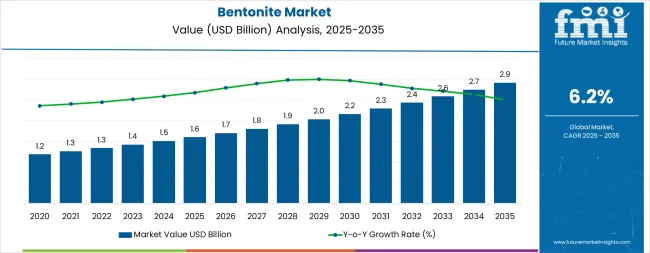
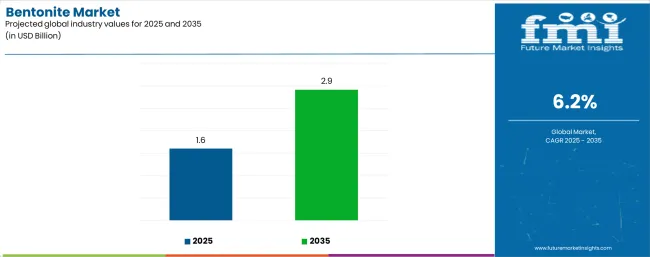
| Metric | Value |
|---|---|
| Industry Size (2025E) | USD 1.6 billion |
| Industry Value (2035F) | USD 2.9 billion |
| CAGR (2025 to 2035) | 6.2% |
The market demonstrates distinct growth phases with varying market characteristics and competitive dynamics. Between 2025 and 2030, the market progresses through its steady expansion phase, growing from USD 1.6 billion to USD 2.1 billion with consistent annual increments averaging 6.2% growth. This period showcases the transition from basic bentonite clay to advanced sodium bentonite systems with enhanced swelling properties and integrated quality control systems becoming mainstream features.
The 2025-2030 phase adds USD 500 million to market value, representing 42% of total decade expansion. Market maturation factors include standardization of drilling fluid protocols, declining processing costs for specialized bentonite grades, and increasing industry awareness of mineral benefits reaching optimal performance in drilling and waterproofing applications. Competitive landscape evolution during this period features established mineral companies like Ashapura and Clariant expanding their bentonite portfolios while specialty producers focus on high-swelling formulation development and enhanced processing capabilities.
From 2030 to 2035, market dynamics shift toward advanced mineral processing and global infrastructure expansion, with accelerated growth continuing from USD 2.1 billion to USD 2.9 billion, adding USD 700 million or 58% of total expansion. This phase transition centers on specialized bentonite grades, integration with automated drilling and construction networks, and deployment across diverse oil and gas and infrastructure scenarios, becoming standard rather than specialized applications. The competitive environment matures with focus shifting from basic mineral capability to comprehensive drilling fluid optimization systems and integration with environmental monitoring platforms.
At-a-Glance Metrics
| Metric | Value |
|---|---|
| Market Value (2025) → | USD 1.6 billion |
| Market Forecast (2035) ↑ | USD 2.9 billion |
| Growth Rate ★ | 6.2% CAGR |
| Leading Technology → | Sodium bentonite Product Type |
| Primary Application → | Oil & Gas End Use Segment |
The market demonstrates strong fundamentals with sodium bentonite systems capturing a dominant share through advanced swelling properties and drilling fluid optimization capabilities. Oil and gas applications drive primary demand, supported by increasing exploration activity and drilling technology requirements. Geographic expansion remains concentrated in developed markets with established energy infrastructure, while emerging economies show accelerating adoption rates driven by infrastructure development and rising construction standards.
Market expansion rests on three fundamental shifts driving adoption across the oil and gas and construction sectors. Oil and gas drilling activity creates compelling operational advantages through bentonite drilling fluids that provide superior wellbore stability and filtration control without formation damage, enabling drilling operators to meet technical specifications while maintaining operational efficiency and reducing non-productive time. Infrastructure development accelerates as construction projects worldwide seek effective waterproofing systems that complement traditional building materials, enabling precise sealing applications and moisture control that align with industry standards and structural durability requirements.
Environmental protection enhancement drives adoption from waste management facilities and civil engineering projects requiring effective barrier solutions that minimize groundwater contamination while maintaining operational effectiveness during landfill construction and underground structure sealing operations. Growth faces headwinds from raw material quality challenges that vary across mining regions regarding the availability of high-swelling bentonite deposits, which may limit adoption in quality-sensitive drilling applications. Technical limitations also persist regarding thermal stability and chemical compatibility that may reduce effectiveness in extreme downhole conditions, which affect drilling fluid performance and wellbore integrity.
The bentonite market represents a specialized industrial mineral opportunity driven by expanding global drilling activity, infrastructure construction development, and the need for superior fluid rheology and sealing performance in oil and gas and civil engineering applications. The market's growth trajectory from USD 1.6 billion in 2025 to USD 2.9 billion by 2035 at a 6.2% CAGR reflects fundamental shifts in drilling technology requirements and construction waterproofing optimization. Geographic expansion opportunities are particularly pronounced in emerging markets, where the dominance of sodium bentonite (64.0% market share) and oil and gas applications (35.0% share) provides clear strategic focus areas.
Strengthening the dominant sodium bentonite segment (64.0% market share) through enhanced mineral processing, superior swelling capacity, and seamless integration with drilling fluid formulation infrastructure. This pathway focuses on optimizing montmorillonite content, improving rheological properties, and developing specialized grades for diverse drilling applications including drilling-grade (46.0%), construction-grade (24.0%), environmental-grade (18.0%), and pharma/food-grade (12.0%) formulations. Market leadership consolidation through advanced beneficiation technology and comprehensive quality monitoring enables premium positioning while defending competitive advantages. Expected revenue pool: USD 130-200 million
Rapid infrastructure growth across Spain (8.5% CAGR), Brazil (8.2% CAGR), and Mexico (8.1% CAGR) creates substantial expansion opportunities through local mining capabilities and processing partnerships. Growing drilling activity, tunneling projects, and government infrastructure initiatives drive steady demand for bentonite systems. Localization strategies reduce transportation costs, enable faster supply response, and position companies advantageously for industrial procurement programs. Expected revenue pool: USD 110-175 million
Expansion within the dominant oil and gas segment (35.0% market share) through specialized formulations addressing drilling quality standards, high-temperature well requirements, and comprehensive fluid stability for exploration and development wells (55.0%), workover operations (20.0%), pipeline construction (15.0%), and well abandonment (10.0%). This pathway encompasses automated mixing systems, quality control integration, and compatibility with diverse drilling environments, supporting modern drilling operations. Expected revenue pool: USD 95-150 million
Strategic expansion into drilling fluids applications (29.0% market share) requires enhanced viscosity control, superior filtration properties, and specialized formulations addressing onshore oil and gas (52.0%), offshore operations (20.0%), horizontal directional drilling (18.0%), and geothermal drilling (10.0%). This pathway addresses diverse drilling scenarios with advanced rheological engineering while creating opportunities for long-term supply agreements and technical service partnerships. Expected revenue pool: USD 80-125 million
Development of specialized bentonite products for construction waterproofing, geosynthetic clay liners, and environmental sealing applications addressing infrastructure requirements and regulatory compliance needs. This pathway encompasses civil engineering applications, tunneling projects, landfill liners, and groundwater protection systems. Technology differentiation through proprietary processing methods and application-specific optimization enables diversified revenue streams while expanding addressable market opportunities. Expected revenue pool: USD 70-110 million
Expansion within high-growth Asia-Pacific markets, particularly China (7.8% CAGR) and India (7.1% CAGR), through mining capacity development, urban infrastructure projects, and comprehensive supply chain establishment. This pathway encompasses metro tunneling, water treatment, landfill capping, and pharmaceutical processing applications, creating opportunities for regional manufacturing relationships and market penetration across diverse industrial sectors. Expected revenue pool: USD 60-95 million
Development of high-value bentonite grades for foundry molding, PET litter, pharmaceutical excipients, and wine clarification applications addressing premium quality standards and specialized processing requirements. This pathway encompasses food-grade certifications, cosmetic applications, and industrial specialty uses. Premium positioning reflects advanced purification capabilities and regulatory compliance while enabling access to high-margin market segments and comprehensive technical support programs. Expected revenue pool: USD 50-80 million
Primary Classification: The market segments by product type into Sodium bentonite, Calcium bentonite, and Others categories, representing the evolution from basic clay minerals to specialized high-swelling formulations for comprehensive industrial application optimization.
Secondary Classification: Application segmentation divides the market into Drilling fluids, Construction waterproofing, Foundry molding, Environmental sealing, Pet litter, and Others sectors, reflecting distinct requirements for rheological performance, sealing capability, and processing standards.
Tertiary Classification: End use segmentation covers Oil & Gas, Construction & Infrastructure, Foundry & Metallurgy, Environmental management, Agriculture, and Others applications, demonstrating varied adoption patterns across energy exploration, civil engineering, and industrial manufacturing sectors.
Regional Classification: Geographic distribution covers North America, Europe, Asia Pacific, Latin America, and the Middle East & Africa, with developed markets leading adoption while emerging economies show accelerating growth patterns driven by infrastructure development programs.
The segmentation structure reveals technology progression from standard calcium bentonite toward specialized sodium bentonite systems with enhanced swelling and rheological capabilities, while application diversity spans from drilling fluids to environmental barriers requiring precise mineral solutions.
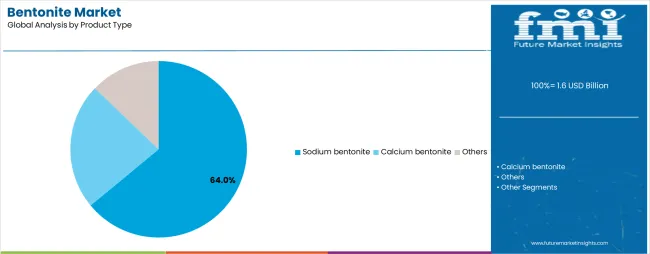
Market Position: Sodium bentonite systems command the leading position in the market with approximately 64.0% market share through advanced swelling properties, including superior water absorption, rheological control capability, and filtration performance that enable drilling operators and construction firms to achieve optimal fluid stability across diverse oil and gas and civil engineering environments.
Value Drivers: The segment benefits from drilling contractor preference for proven mineral systems that provide consistent fluid properties, enhanced wellbore stability, and operational efficiency optimization without requiring significant formulation modifications. Advanced processing features enable high-yield applications, filtration control, and integration with existing drilling equipment, where swelling capacity and fluid performance represent critical operational requirements.
Competitive Advantages: Sodium bentonite systems differentiate through superior montmorillonite content, established supply chains, and compatibility with diverse drilling fluid formulations that enhance operational effectiveness while maintaining optimal wellbore conditions suitable for various exploration and construction applications.
Key market characteristics:
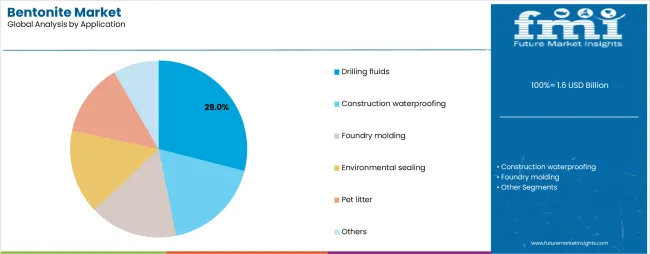
Market Context: Drilling fluids applications dominate the market with approximately 29.0% market share due to critical role in wellbore construction and increasing focus on drilling efficiency optimization, fluid loss control, and formation damage prevention applications that support modern oil and gas exploration operations.
Appeal Factors: Drilling operators prioritize fluid stability, filtration control, and integration with existing drilling systems that enable coordinated mud engineering across multiple well programs. The segment benefits from substantial oil and gas investment and drilling technology advancement that prioritize bentonite-based fluids for quality control and operational efficiency applications.
Growth Drivers: Global drilling activity expansion incorporates bentonite as essential material for drilling fluid formulation, while horizontal drilling growth increases demand for proven rheological solutions that comply with technical specifications and minimize drilling complications.
Application dynamics include:
Construction waterproofing applications capture significant market share through geosynthetic clay liners, waterproofing membranes, and civil engineering sealing systems. Foundry molding, environmental sealing, and PET litter applications demonstrate steady demand across specialized industrial and consumer segments.
Market Context: Oil & Gas applications dominate the Bentonite market with approximately 35.0% market share due to widespread adoption in drilling operations and increasing focus on exploration efficiency, well construction quality, and formation protection applications that minimize non-productive time while maintaining wellbore integrity.
Appeal Factors: Oil and gas operators prioritize bentonite reliability, fluid performance consistency, and technical support for drilling programs that enable effective wellbore management across multiple field developments. The segment benefits from substantial upstream investment and exploration technology advancement that prioritize quality drilling fluid systems for well construction applications.
Growth Drivers: Exploration and development activity (55.0%) expands across conventional and unconventional resources, while workover and completion operations (20.0%) increase demand for specialized bentonite formulations that comply with technical requirements and operational standards.
Market Challenges: Varying geological conditions and drilling fluid requirements may limit bentonite standardization across different basin types or operational scenarios.
Application dynamics include:
Construction & Infrastructure applications capture significant market share through waterproofing, tunneling, and civil engineering projects. Foundry & Metallurgy, Environmental management, and Agriculture segments serve specialized industrial and regulatory requirements.
Growth Accelerators: Oil and gas exploration expansion drives primary adoption as bentonite drilling fluids provide wellbore stability and filtration control capabilities that enable drilling operators to meet technical specifications without excessive formation damage, supporting exploration missions and field development projects that require high-performance fluid systems. Infrastructure construction demand accelerates market expansion as civil engineering projects seek effective waterproofing and sealing systems that minimize groundwater infiltration while maintaining structural effectiveness during tunneling and underground construction scenarios. Industrial mineral spending increases worldwide, creating constant demand for bentonite products that complement traditional materials and provide operational flexibility in complex drilling and construction environments.
Growth Inhibitors: Raw material quality variability persists across mining operations regarding the availability of high-swelling sodium bentonite deposits and consistent montmorillonite content, which may limit operational flexibility and market penetration in regions with geological constraints or quality-sensitive drilling applications. Thermal and chemical stability limitations affect performance in extreme downhole conditions and specialized industrial environments, reducing effectiveness in high-temperature wells or chemically aggressive formations. Market fragmentation across multiple industrial specifications and regional quality standards creates compatibility concerns between different bentonite grades and existing operational requirements.
Market Evolution Patterns: Adoption accelerates in oil and gas and infrastructure sectors where performance requirements justify mineral costs, with geographic concentration in resource-rich regions transitioning toward mainstream adoption in emerging markets driven by drilling activity expansion and infrastructure development. Technology development focuses on enhanced beneficiation processes, improved activation methods, and integration with automated mixing systems that optimize fluid properties and operational effectiveness. The market could face disruption if synthetic polymer alternatives or advanced drilling fluid technologies significantly reduce reliance on natural bentonite in mainstream drilling applications. Environmental compliance enhancement enables green mining practices, water recycling integration, and circular economy initiatives that optimize resource efficiency while supporting operators' transition toward responsible sourcing and comprehensive environmental management platforms.
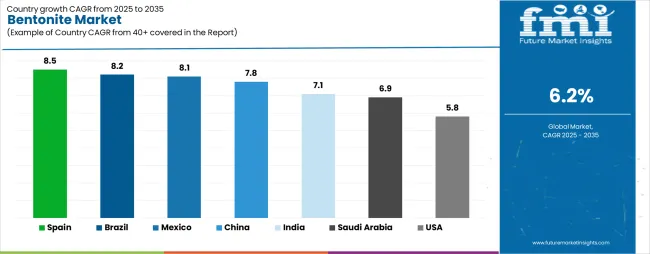
The market demonstrates varied regional dynamics with Growth Leaders including Spain (8.5% CAGR) and Brazil (8.2% CAGR) driving expansion through infrastructure development and drilling activity growth. High-Growth Markets encompass Mexico (8.1% CAGR), China (7.8% CAGR), and India (7.1% CAGR), benefiting from construction modernization and resource exploration. Steady Performers feature Saudi Arabia (6.9% CAGR) and the United States (5.8% CAGR), where energy sector applications and environmental compliance support consistent growth patterns.
| Country | CAGR (2025-2035) |
|---|---|
| Spain | 8.5% |
| Brazil | 8.2% |
| Mexico | 8.1% |
| China | 7.8% |
| India | 7.1% |
| Saudi Arabia | 6.9% |
| United States | 5.8% |
Regional synthesis reveals Europe and Latin America markets leading growth through infrastructure investment and energy development, while Asia-Pacific countries maintain robust expansion supported by urbanization programs and industrial mineral demand. Middle Eastern markets show steady growth driven by oil and gas activity and infrastructure modernization.
Spain establishes the highest growth trajectory in developed markets through aggressive infrastructure development programs and comprehensive tunneling projects, integrating bentonite as essential material in civil engineering applications and geosynthetic clay liner installations. The country's 8.5% CAGR reflects EU-funded infrastructure initiatives and metro construction programs that mandate the use of quality sealing systems in underground construction and environmental protection facilities. Growth concentrates in major urban centers where tunneling development showcases integrated bentonite supply chains that appeal to construction firms seeking reliable waterproofing and ground control solutions.
Spanish mineral producers are developing specialized bentonite grades that combine domestic mining advantages with EU quality standards, including environmental sealing features and construction waterproofing capabilities. Distribution channels through civil engineering contractors and environmental protection suppliers expand market access, while government support for infrastructure modernization supports adoption across diverse construction and waste management segments.
Strategic Market Indicators:
Brazil's market expansion benefits from diverse industrial demand, including pre-salt drilling fluid requirements, dam construction and landfill sealing projects, and government environmental remediation programs that incorporate bentonite solutions for soil and water treatment applications. The country maintains an 8.2% CAGR, driven by rising offshore drilling activity and increasing awareness of environmental protection benefits for groundwater and surface water quality management.
Market dynamics focus on cost-effective bentonite solutions that balance technical performance with affordability considerations important to Brazilian drilling contractors and construction operators. Growing oil and gas development creates constant demand for drilling-grade bentonite in offshore exploration projects.
Strategic Market Considerations:
Mexico's market demonstrates robust expansion through horizontal directional drilling applications, diaphragm wall construction for transport infrastructure, and growing offshore and shale drilling activity that increasingly incorporate bentonite solutions for drilling and civil engineering optimization applications. The country holds an 8.1% CAGR, supported by government energy sector development and infrastructure modernization programs that promote bentonite adoption for drilling fluid and construction sealing facilities. Mexican contractors are implementing bentonite systems that provide reliable performance and technical support, particularly appealing in energy corridors where operational efficiency and wellbore stability represent critical requirements.
Market expansion benefits from North American supply chain integration and energy sector technology transfer that enable adoption of proven bentonite formulations for drilling and trenchless construction applications.
Market Intelligence Brief:
China's advanced industrial ecosystem demonstrates sophisticated bentonite deployment with documented operational effectiveness in urban infrastructure and water treatment applications through integration with large-scale construction programs. The country leverages domestic reserves and manufacturing scale to maintain a 7.8% CAGR. Major cities showcase extensive installations where bentonite systems integrate with comprehensive metro tunneling platforms and landfill capping projects to optimize ground control and environmental protection.
Chinese bentonite producers prioritize production capacity and cost optimization in mineral development, creating demand for reliable clay systems with proven sealing characteristics. The market benefits from established construction infrastructure and substantial investment in urban rail development that provides long-term growth opportunities.
Market Intelligence Brief:
India demonstrates steady market development with a 7.1% CAGR, distinguished by infrastructure operators' focus on quality bentonite systems for metro construction and tunneling projects that integrate with Smart Cities initiatives. The market prioritizes reliable sealing features and pharmaceutical processing applications in Gujarat industrial clusters, while growing cat-litter production facilities reflect emerging consumer segment opportunities that support long-term market expansion.
Saudi Arabia's market prioritizes comprehensive infrastructure development and sustained oil and gas drilling intensity through bentonite systems that manage drilling fluid performance, landfill sealing, and aquifer protection applications as part of Vision 2030 modernization programs. The country holds a 6.9% CAGR, driven by government megaproject investment and petroleum sector activity that support bentonite adoption for drilling and environmental applications. Saudi operators prioritize operational reliability with bentonite systems delivering consistent performance through proven mineral quality and technical support.
Technology deployment channels include major drilling contractors, infrastructure developers, and environmental compliance programs that support professional applications for complex drilling and civil engineering projects.
Performance Metrics:
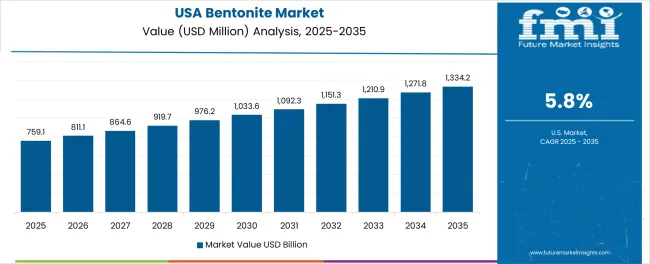
The USA market prioritizes shale drilling applications and environmental compliance through bentonite systems that manage drilling fluid rheology, EPA-mandated landfill liner requirements, and construction waterproofing applications through established supply networks. The country holds a 5.8% CAGR, driven by unconventional resource development and workover activity that support bentonite consumption. American operators prioritize operational effectiveness with bentonite systems delivering consistent fluid properties through proven mineral quality standards.
Manufacturing quality standards focusing high-swelling grades expand market appeal across diverse operational requirements seeking performance and regulatory compliance benefits.
Strategic Market Indicators:
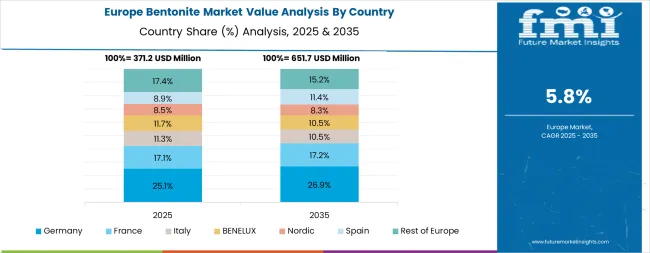
Europe is estimated to account for 23.0% of global bentonite revenues in 2025, approximately USD 0.4 billion. Within Europe, Spain leads with 21.0% share through civil engineering, tunneling liner applications, and cat-litter production, followed by Germany at 18.0% for foundry binders and environmental sealing. France holds 16.0% share driven by pharmaceutical, cosmetics, wine clarification, and waterproofing applications. Italy commands 12.0%, while the United Kingdom accounts for 11.0% of European bentonite demand. The Nordic region represents 7.0%, Benelux contributes 6.0%, and Central & Eastern Europe accounts for 9.0% of the regional market. Growth through 2035 is supported by EU landfill and groundwater protection regulations, rail and metro construction projects, and premium pharmaceutical and food-grade product demand requiring high-purity bentonite formulations and comprehensive quality documentation.
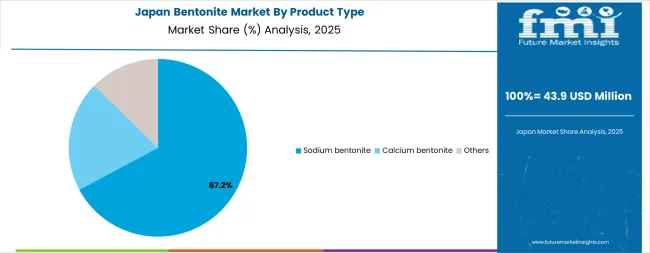
In Japan, the market prioritizes sodium bentonite formulations, which capture the dominant share of industrial installations due to their advanced features, including superior swelling capacity and proven compatibility with existing drilling fluid and construction sealing infrastructure. Japanese industrial operators prioritize quality, consistency, and long-term supply reliability, creating demand for sodium bentonite systems that provide stable rheological properties and adaptive performance based on application requirements and environmental conditions. Calcium bentonite and specialty grades maintain secondary positions primarily in foundry applications and specialized industrial processes where specific mineral properties meet operational requirements without compromising processing efficiency.
Market Characteristics:
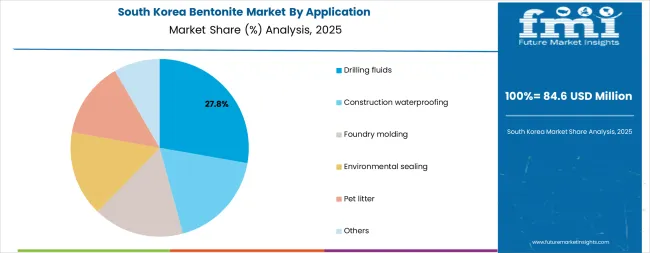
In South Korea, the market structure favors international mineral companies, including Clariant, Imerys, and regional suppliers, which maintain positions through comprehensive product portfolios and established industrial networks supporting both drilling and construction installations. These providers offer integrated solutions combining quality bentonite grades with technical support services and ongoing supply reliability that appeal to Korean manufacturers seeking dependable mineral systems. Local distributors and mining operators capture market share by providing localized service capabilities and competitive pricing for standard industrial applications, while domestic suppliers focus on specialized grades tailored to Korean industrial characteristics.
Channel Insights:
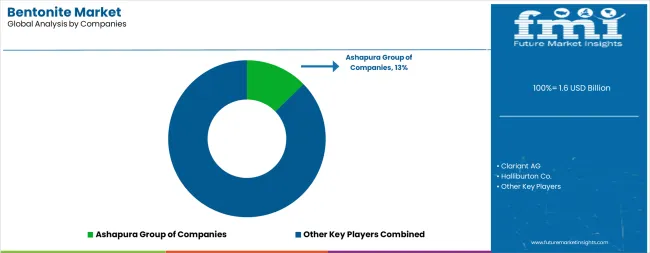
The market operates with moderate concentration, featuring approximately 15-20 meaningful participants, where leading companies control roughly 40-45% of the global market share through established industrial relationships and comprehensive mineral portfolios. Ashapura Group of Companies holds the leading position with approximately 13.0% market share through extensive mining operations, global drilling industry networks, and comprehensive processing capabilities. Competition prioritizes product quality, supply reliability, and mineral consistency rather than price-based rivalry.
Market Leaders encompass Ashapura, Clariant, and Halliburton, which maintain competitive advantages through extensive bentonite reserves, global oil and gas industry partnerships, and comprehensive technical support capabilities that create customer relationships and support premium positioning. These companies leverage decades of mining experience and ongoing processing investments to develop consistent bentonite grades with reliable swelling characteristics and quality features.
Technology Innovators include Wyo-Ben, Black Hills Bentonite, and Imerys, which compete through specialized processing technology focus and innovative activation development that appeal to drilling contractors seeking advanced rheological capabilities and fluid performance. These companies differentiate through beneficiation expertise and specialized drilling fluid application focus.
Regional Specialists feature companies like Kunimine Industries, Mineral Technologies, Kemira, and Polymer Drilling Systems, which focus on specific geographic markets and specialized applications, including high-swelling systems and environmental treatment programs. Market dynamics favor participants that combine reliable mineral quality with efficient logistics, including consistent supply and technical support capabilities. Competitive pressure intensifies as established mineral companies expand processing capacity while specialized producers challenge incumbents through innovative bentonite solutions and cost-effective formulations targeting high-growth drilling and construction segments.
| Item | Value |
|---|---|
| Quantitative Units | USD 1.6 billion |
| Product Type | Sodium bentonite, Calcium bentonite, Others |
| Application | Drilling fluids, Construction waterproofing, Foundry molding, Environmental sealing, Pet litter, Others |
| End Use | Oil & Gas, Construction & Infrastructure, Foundry & Metallurgy, Environmental management, Agriculture, Others |
| Regions Covered | North America, Europe, Asia Pacific, Latin America, Middle East & Africa |
| Countries Covered | Spain, Brazil, Mexico, China, India, Saudi Arabia, the USA, and 25+ additional countries |
| Key Companies Profiled | Ashapura Group of Companies, Clariant, Halliburton, Wyo-Ben, Black Hills Bentonite, Imerys, Kunimine Industries, Mineral Technologies |
| Additional Attributes | Dollar sales by product type, application, and end use categories, regional adoption trends across North America, Europe, and Asia-Pacific, competitive landscape with mineral producers and drilling fluid suppliers, oil and gas operator preferences for fluid stability and supply reliability, integration with drilling and construction platforms and quality monitoring systems, innovations in high-swelling bentonite processing and environmental applications, and development of automated beneficiation solutions with enhanced mineral quality and industrial optimization capabilities. |
The global bentonite market is estimated to be valued at USD 1.6 billion in 2025.
The market size for the bentonite market is projected to reach USD 2.9 billion by 2035.
The bentonite market is expected to grow at a 6.2% CAGR between 2025 and 2035.
The key product types in bentonite market are sodium bentonite, calcium bentonite and others.
In terms of application, drilling fluids segment to command 29.0% share in the bentonite market in 2025.






Full Research Suite comprises of:
Market outlook & trends analysis
Interviews & case studies
Strategic recommendations
Vendor profiles & capabilities analysis
5-year forecasts
8 regions and 60+ country-level data splits
Market segment data splits
12 months of continuous data updates
DELIVERED AS:
PDF EXCEL ONLINE
Bentonite Clay Market Forecast Outlook 2025 to 2035
Bentonite Cat Litter Market Analysis by Type, Composition, Distribution Channel and Region Through 2025 to 2035
Sulphur Bentonite Market Size and Share Forecast Outlook 2025 to 2035
Demand for Bentonite in EU Size and Share Forecast Outlook 2025 to 2035
Asia Pacific Bentonite Market Size and Share Forecast Outlook 2025 to 2035
Organo-Modified Bentonite Market Growth - Trends & Forecast 2025 to 2035

Thank you!
You will receive an email from our Business Development Manager. Please be sure to check your SPAM/JUNK folder too.
Chat With
MaRIA